To celebrate the fiftieth anniversary of the longest-running science-fiction show in the world, I’ll be taking weekly looks at some of my own personal favourite stories and arcs, from the old and new series, with a view to encapsulating the sublime, the clever and the fiendishly odd of the BBC’s Doctor Who.
The Deadly Assassin originally aired in 1976.
I deny this reality.
– the Doctor
The Deadly Assassin is a rather boldly experimental episode of Doctor Who. It’s the first story told without a companion character, and it also ventures quite forcefully into the realm of surrealism. It offers a rather bold deconstruction of the Time Lords, a rather cynical depiction of the aliens who had seemed all-powerful in stories like The War Games or The Three Doctors. More than that, though, The Deadly Assassin feels – appropriately enough – like a treatise on the inevitable death of Doctor Who.
Located in the middle of the fourteenth of twenty-six seasons, and broadcast thirteen years from both the start and the end of the show’s initial run, The Deadly Assassin seems to be positioned at the very heart of Doctor Who.
Death seems to linger on the mind of the adventure, in case the title wasn’t a clue enough. The Deadly Assassin is one of those great tautology titles the show would occasionally produce, and it really does underscore the fact that “death” is the order of the day. Most obviously, the plot of the episode centres around the death of the Time Lord High President. Even after the character is unceremoniously killed at the climax of the first episode, the absurd chalk outline of his robes and uniform remain behind to remind us of the plot’s primary motivator.
The assassination is, of course, designed to remind us of the death of John F. Kennedy in Dallas on the 23rd November 1963.The leader of Gallifrey is identified as a High President, even if the selection process seems a bit less than democratic. The outgoing High President names his successor, which seems quite strange. Then again, I have difficulty understanding the justification for the electoral college, so perhaps it’s an intentional jab. Then again, I suppose that Britain’s political structure is just as convoluted, so it’s possible that a non-democratic president is akin to constitutional monarch.
The High President is, according to initial suspicions assassinated using a high-power sniper rifle during a high-profile event that is being recorded and broadcast. Playing off the conspiracy lore surrounding the death of Kennedy, it turns out that the character holding the rifle (the Doctor) is a patsy and there was a second shooter involved in a conspiracy that stretches far beyond the death of an individual. The episode even references the involvement of the CIA. “Celestial Intervention Agency,” Spandrall explains, helpfully. “They get their fingers into everything.”
President Kennedy was assassinated on the day before that the first part of An Unearthly Child was broadcast. Kennedy’s assassination dominated coverage so heavily that the BBC arranged to repeat that first episode the following week, just before the next part was broadcast. Kennedy’s assassination cast an incredible shadow over a whole of sixties pop culture, and even beyond. Gene Roddenberry’s original pitch for Star Trek II, for example, included the crew travelling back to Dallas in 1963.
So The Deadly Assassin draws attention to the fact that, even at the beginning, death had haunted Doctor Who. An Unearthly Child had been tangled up in the Kennedy assassination on initial broadcast. The show had devised a way of changing leading actors through a process of death and rebirth called “regeneration.” Death and life were tied up with one another in Doctor Who, and it feels strange that The Deadly Assassin should broadcast in 1976, half way between the show’s birth and its first death. There’s no way that Holmes could have known that at the time, but it’s interesting to think about.
Of course, The Deadly Assassin explores death and Doctor Who in a number of ways. For example, this is the serial that establishes the infamous thirteen-regeneration limit, effectively setting a cap on the number of times that the show could change its leading actor. Of course, it’s highly unlikely Holmes was imagining that the show would be reaching its Eleventh Doctor as it approached its fiftieth anniversary.
The Deadly Assassin needs to provide a justification for the Master’s actions and his scarred appearance. If he can just regenerate after being so gravely wounded, then there’s no reason for the character to look as creepy as he does here. By suggesting that this is the Master’s final life, the script gets some additional dramatic tension and explains why the Master looks so grotesque and acts so desperate. One imagines that Holmes picked an arbitrary number large enough that the show would be unlikely to reach it before it was cancelled or before it was retired. And thirteen sounds suitably ominous.
Again, this is something outside of Holmes’ control, but it adds a strange resonance to The Deadly Assassin. It seems like Doctor Who fandom began to fixate on that number. It became a figure set in stone, a countdown to the inevitable death of the show. So much so that, during Colin Baker’s time in the role, when the show’s ardent fans had taken control of the series, an entire year-long arc, The Trial of a Time Lord, was built around the inevitable death of the lead.
Naturally, the villain of that arc – a split offshoot of the Doctor’s personality created before his final regeneration – has become inordinately popular. The Valeyard is hardly the most compelling or exciting foe the show has ever created. Indeed, he was a cut-price version of the Master at a time when the Master himself had become a cut-price version of himself. However, it seemed like Doctor Who had embraced a weird fetishism built around the inevitable death of its lead character.
It seems counter-intuitive. You would assume that fans of the show would rather the show stayed on the air as long as possible, that they would want it to continue with as many new actors as it could. After all, this is a version of fandom that can be quite selective about what it deems to be canon, and can easily dismiss any dialogue that doesn’t support their vision of the leading character. Nobody takes the Doctor’s assertion in the television movies that he is “half-human” in any way seriously, but this line about thirteen lives has become an essential part of the Doctor Who mythology, one which has defied all attempts to revise or update it.
Even recently, the man who resurrected the show, Russell T. Davies, attracted a great deal of attention for his attempts to revise that figure. Writing an episode of The Sarah Jane Adventures after he had departed Doctor Who as showrunner, Davies had the Doctor state that he could have 507 faces. Talking about the line afterwards, Davies all but conceded that the number thirteen has become so engrained that there’s no real way to dislodge it from fandom:
There’s a fascinating academic study to be made out of how some facts stick and some don’t – how Jon Pertwee’s Doctor could say he was thousands of years old, and no-one listens to that, and yet someone once says he’s only got thirteen lives, and it becomes lore. It’s really interesting, I think. That’s why I’m quite serious that that 507 thing won’t stick, because the 13 is too deeply ingrained in the public consciousness. But how? How did that get there? It’s fascinating, it’s really weird. Anyway, that’ll be my book in my retirement!
So, more than thirty years after it aired, The Deadly Assassin is still predicting the death of Doctor Who, beginning a slow and steady countdown, something akin to Chinese water torture. Of course, I doubt any sane person expects the BBC to cancel its cashcow after the thirteenth lead actor departs, but there is a very ardent group of fans out there who seem to treat every new episode as another tick of a clock that is coming closer and closer to zero.
There are other ways that The Deadly Assassin ties into the death of the show itself. Perhaps, most obviously, there’s the fact that it was the episode that really brought out Mary Whitehouse against the show. The powerful third-episode cliffhanger is one of the show’s most iconic moments, but it’s what provoked the social crusader to bring the show within her cross-hairs:
What finally persuaded me to complain was a story I heard from a young mother who lives nearby. During the week following the programme, her son of five said to her, apparently a propos of nothing in particular, “Mummy, I know what to do with (his younger brother) when he makes me cross. I shall hold his head under the bath water until he’s still like the man did with Dr. Who.” The truth of the matter, of course, is that Doctor Who was always intended as an early evening adult viewer catcher – catch ’em early and you’ve got them for the night, so the ‘research’ shows. After all, we must keep our priorities right, mustn’t we?
The programme contains some of the sickest and most horrific material ever seen on children’s television, but no-one has to take my word that such material is likely to disturb. For young children, even a week may be too long to wait for reassurance that the characters with whom they identify are safe. Doctor Who has turned into tea-time brutality for tots. My personal reaction to the sight of the Doctor being viciously throttled underwater is unimportant. What’s important is the effect of such material – especially in a modern setting – upon the very young children still likely to be watching. Strangulation – by hand, by claw, by obscene vegetable matter – is the latest gimmick, sufficiently close-up so that they get the point. And, just for a little variety, show the children how to make a Molotov cocktail.
It is, of course, utter nonsense. It’s condescending to children and detrimental to television drama. What with being a child myself, and growing up in the era of all these seemingly detrimental pop culture influences, I think it’s fair to argue that children are a bit tougher than these moral guardians give them credit for.
Discussing the matter after the fact, producer Philip Hinchcliffe makes a similar argument:
Personally, I felt those two scenes in The Ark in Space and The Seeds of Doom were far more frightening than the one which did create the big fuss with Mrs. Whitehouse where, in The Deadly Assassin cliff-hanger to part three, we held the Doctor’s head under water that bit too long. So what Bob and I discovered was that, having made the series more adult and more realistic, we had to run up against the thin dividing line between what is acceptable to Saturday tea-time family viewing and what is not. I felt we steered a pretty good line and I would suggest that most of Mrs. Whitehouse’s criticisms were somewhat over-hysterical.
At the time, there were a lot of people at the BBC who were very worried about Mrs. Whitehouse’s general onslaught at the Corporation. But, at the same time on my front, there were medical experts writing to me saying that Doctor Who was having beneficial effects on children, that it was helping children to crystalise what had previously been inarticulated fears. In other words, if a child can actually pin its fears on something that is acted out, then although the child might be frightened during the battle of good versus evil, it gains a release and a removal of those fears when the Doctor is seen to win at the end.
It’s a valid argument, and I’d go a bit further. Even children are shrewd enough to recognise the realities of dramatic tension. If there’s never even a hint of ambiguity around the lead character’s fate, or if the outcome of the story is never in doubt, then it’s hard to get too bothered about the whole thing. Adults can criticise drama for being bland and predictable, so why is it acceptable to serve that sort of show to children?
Still, the matter would seem to have been settled when the BBC itself offered a comment on the matter. Those expecting it to defend its creative integrity and the talented individuals working on a British institution would be sorely disappointed by language that seemed almost apologetic and almost conciliatory. Charles Curran offered:
The television service was not totally satisfied with the way The Deadly Assassin developed. With hindsight, the service does accept that one or two viewers may have imagined that Dr. Who’s dreams were reality. What actually happened was that the head of the department felt, before these episodes were transmitted, that some of the sequences were a little too realistic for a science-fiction series. Accordingly, several of them were edited out before transmission.
In a very real way, The Deadly Assassin assured the death of Doctor Who in a more than just the minds of fans counting down to unlucky number thirteen.
Robert Holmes and Philip Hinchcliffe would be shuffled off the show at the end of the year, replaced by producer Graham Williams. I’m more sympathetic to the future producers and script editors than most fans are, but I think that the removal of Holmes and Hinchcliffe crippled the show. The BBC decided that Doctor Who would tone down the violence and the scares, and would refrain from broadcasting anything that might upset children – or provoke Mary Whitehouse into causing a high-profile scandal about “tea-time brutality for tots” or some such nonsense.
So, with horror off the table, Doctor Who really found itself struggling to find a voice. Over the next few years, the show would struggle to find a way to tell stories without relying on suspense or threat. It’s not impossible – and there are some wonderful episodes in the years ahead – but a pulpy science-fiction serial like Doctor Who does need some sense of threat or some sense of horror to keep it ticking over.
You could argue that it wasn’t the absence of that suspense and horror that was the real problem though. It was the reaction that absence, the counter movement. As much as the show might have clumsily lurched along, struggling to set a tone, during the Williams era, the real trouble began after Williams had left. In the eighties, the show reintroduced the elements of horror that had been so sorely absent, and it did so less than gracefully.
There were a number of factors at play. Fans who had grown up with the show, and had obviously heavily influenced by Holmes and Hinchcliffe, began working behind the scenes on the show towards the end of Peter Davison’s tenure and during Colin Baker’s time in the lead role. So the show started to cater to their interests and their vision of Doctor Who. It seems quite clear that there was some element of bitterness over the way the show had been compromised by dictates about toning down the violence and the brutality.
One suspects that the forces at work behind the scenes resented the fact that Doctor Who had been without horror for so long, that it had been watered down by the choices Graham Williams had been forced to make by the BBC. So, during Davison’s final year, the show brought back horror. In a big way. However, this horror lacked the restraint and the refinement of the horror used during the Holmes and Hinchcliffe era.
It seemed to be violence and brutality used for the sake of violence and brutality, as if the kids had finally taken that forbidden item off the top shelf of the pantry. It was clear that the show had forgotten how to use horror as an effective storytelling tool, and so we got episodes like Attack of the Cybermen or Timelash. This excess – far greater than anything during the Holmes and Hinchcliffe era – was undoubtedly one of the factors that pushed Doctor Who out of the mainstream and into the realm of cult. And that played a major role in the show’s cancellation.
Again, this isn’t something that it’s fair to place at the feet of The Deadly Assassin. We are talking about a reaction to a reaction to the episode. And yet, despite that, it feels strangely appropriate that The Deadly Assassin should serve as a nexus of all this doom and gloom, that it should – unintentionally – serve as an assassin responsible for the slow and painful death of the original show, stretched across the remaining thirteen years of the show’s existence. There’s that number again.
Which brings us to the final way that The Deadly Assassin seems to serve as the point at which Doctor Who sealed its own fate, albeit entirely accidentally and unforeseeably. It’s interesting to note that – despite the way that fandom has latched on to the continuity at the heart of the story – The Deadly Assassin was not originally well-received by fans at the time. Despite the fact that it is a classic piece of Doctor Who, and frequently ranked among the show’s best episodes, initially reception was chilly.
As Robert Holmes concedes, there was a reason for this:
It was Philip (Hinchcliffe)’s idea to do The Deadly Assassin and we decided I should write it. He said it would be good to explore this place we’ve never been to – home of the Time Lords. Lis Sladen’s contract was up and we decided to see if we could do a story for the Doctor without a companion, just as a rest. It was also the first story, if you discount the Master, that we struck the ‘received law’ that every Doctor Who story had to have a monster. There were no monsters and The Deadly Assassin was very popular. It aroused a lot of anger among the traditionalists, but that’s alright.
Holmes also revised the Time Lords significantly. They had previously been presented as all-powerful being capable of bending the universe to their very will. Instead, Holmes makes them seem rather stagnant, including digs at various British institutions.
Gallifrey as presented here, despite the pulpy stylised trappings like the uniforms and the scrolling text, seems very British. When the TARDIS receives the Time Lord equivalent of a parking ticket (“it’s in an unauthorised zone,” Spandrell informs his subordinate, “I want the occupants arrested”), it is sent to a museum rather than an impound lot. Of course, given that the heart of Gallifrey is the “panopticon“, perhaps all of the planet is just one very stylish prison.
The Presidential Resignation Day ceremony is dutifully covered by the planet’s public broadcasters, “public registered video”, with “Runcible the Fatuous” offering a parody of BBC event coverage, complete with inane commentary. “And the one question that is on all their lips, the question of the day, as His Supremacy leaves public life, is who will he name as his successor?” Still, it’s hardly the most brutal criticism that Doctor Who has ever made of its own broadcaster.
That said, the most obvious influence on Holmes’ Gallifrey is clearly the British university system. In Holmes’ cynical style, he’s filled the planet with arrogant and ultimately powerless individuals conducting themselves with a sense of pomp and ceremony that is hardly earned. When Runcible asks Borusa for a comment, the latter is cutting in his reply, “Runcible, you had ample opportunity to ask me questions during your misspent years at the Academy. You failed to avail yourself of the opportunity then and it is too late now. Good day.”
Later on, Runcible encounters the Doctor, and recognises him as a renegade Time Lord. He doesn’t phrase it in political terms (“exiled” or “cast out”), but in academic phraseology. “Oh, I say,” he remarks. “Weren’t you expelled or something? Some scandal?” How terribly British. It seems like Gallifrey is far more like Oxford or Cambridge than Westminster or Buckingham. Which fits quite well, I suppose, since Holmes makes it clear that the Time Lords’ interest in time is mostly academic. After all, these are all-powerful aliens who have access to all of time and space, but they just sit on their home planet whining and moaning about each other.
Indeed, it seems like the Time Lords spend most of their time trying to avoid making decisions. Although he has an ulterior motive for speeding along the Doctor’s trial and execution, Goth justifies the his urgency by explaining that he simply doesn’t want to have to be forced to make a decision when he assumes the office of High President. Conversing with the other the Time Lords, it seems inevitable that Goth will be named the successor to the deceased High President.
Which, he explains, would put him in a bit of a bind when it comes to the Doctor, the man accused of assassinating his predecessor. “But it is the custom, as you know, for an incoming president to pardon political prisoners,” he remarks to Borusa. “Is he to set free the murderer of his predecessor, or break with custom? Either course would be difficult. I intend to avoid the dilemma by seeing this affair through before he takes office.” Best to avoid having to make the decision at all, right?
Later on, we discover that Time Lord history is flexible. After the Master’s alleged death, Borusa informs the Doctor to help with the paperwork. “Then before you leave, you can assist Coordinator Engin to compile a new biog of him. It doesn’t have to be entirely accurate.” The Doctor counters, “Like Time Lord history.” It’s a nice line. After all, you’d imagine that the history of a race mastering time-travel would be prone to change. However, the Time Lords are so boring and so lazy and so disengaged that they can’t even be bothered to use time-travel to re-write their own history properly. They do it the easy way.
As such, it’s no surprise that their own history winds up lost to them. Even the relatively open-minded Spandrell dismisses the Eye of Harmony as “a myth” which “no longer exists.” This is a vital part of Time Lord culture. As the Doctor explains, it’s an essential part of Time Lord identity. “A myth? Spandrell, all the power of the Time Lords devolves from it. Neither flux nor wither nor change their state. Rassilon stabilised all the elements of a black hole and set them in an eternally dynamic equation against the mass of the planet.”
It should be impossible for a race of time-travellers to lose sight of their own history, but it’s a demonstration of how far the Time Lords have fallen, and just how corrupt their culture has become. It’s an absolutely ingenious twist on the Time Lords. It comes at the cost of de-mystifying the aliens, but the show has been steadily eroding away the mystery of the Doctor’s people since they first appeared in The War Games (or even since he first met another in The Time Meddler). At least this take on the Time Lords is clever, a way of explaining why the Doctor would leave Gallifrey, and how such a powerful race would ultimately wind up so impotent.
But there’s something interesting about The Deadly Assassin, and the way that it provoked a reaction. The show was, broadly-speaking, well received by casual viewers. However, fans of the show were less taken with the episode. Jan Vincent-Rudzki, president of the Doctor Who Appreciation Society, wrote a scathing review of the serial. I’m not going to reprint all of it here. If you’re interested, you can find it on-line. However, his opening and closing statements are quite telling:
Few Who stories go very much against what has been done before, but recently this has changed. First, there was Genesis of the Daleks, then Revenge, Morbius, and now Deadly Assassin, or rather “Deadly Continuity.” But first let us look at the programme as someone who hardly ever watches. The costumes and sets are quite effective, but a little too Flash Gordon. It has a good cast and was well acted. The story was fair but did not hold together too well.
Now let’s look at the story as Doctor Who viewers. The following is not only my view, but that of many people (including people who aren’t avid fans).
….
As a Doctor Who story, Deadly Assassin is just not worth considering . I’ve spoken to many people, many of whom were not members, and they all said how this story shattered their illusions of the Time Lords, and lowered them to ordinary people.
Once, Time Lords were all-powerful, awe-inspiring beings, capable of imprisoning planets forever in force fields, defenders of truth and good (when called in). Now, they are petty, squabbling, feeble-minded, doddering old fools.
WHAT HAS HAPPENED TO THE MAGIC OF DOCTOR WHO?
Can’t you feel the fanboy entitlement just radiating from that?
What’s interesting is that Vincent-Rudzki separates viewers of the show into “fans” and “non-fans”, with just a hint of possessive elitism. Apparently, The Deadly Assassin was quite okay for those regular viewers who don’t know any better, but the “true fans” are smart enough to realise that this is just one big con, that the producers are betraying the franchise, undermining the show and moving away from the core values of Doctor Who.
Which is absolute nonsense. There’s nothing wrong with creating a show that normal people can enjoy. Indeed, I’d say that it is a good thing that people can tune into The Deadly Assassin without a thirteen-year history of Doctor Who and enjoy it. This isn’t a show made for the couple of hundred die-hard fans. It is made for millions of people using tax-payers’ money. It’s not a bad thing that it’s a well-made piece of television, which happens to be popular.
However, Vincent-Rudski is outlining a conflict at the heart of Doctor Who which would become increasingly problematic in the years ahead. By serving as one of the earliest and most high-profile focal points of this debate, The Deadly Assassin ties itself, yet again, to the death of Doctor Who. In the eighties, fans would begin to have more and more influence over Doctor Who, working behind the scenes, writing scripts, campaigning for its survival. And it seems like quite a few of those fans agreed with the nonsense that Vincent-Rudski was spouting.
So the show became a piece of cult entertainment aimed at die-hard fans, more concerned with fanboy continuity than good storytelling. We ended up with episodes like Attack of the Cybermen, which aimed to explain various Cybermen-related continuity errors. Arc of Infinity featured the return of a character from ten years ago with no real context or explanation. Warriors of the Deep tied together the Silurians and the Sea-Devils because… why not?
The show became completely engaged with this sort of “true fan” mentality, and closed itself off from the mainstream. It became a lot less accessible, a lot less likely to introduce or explain concepts. If you were a “true fan”, after all, you’d already know this. Perhaps most irritating was the fact that this seemed to be a conscious decision, with the production crew hiring “super-fans” to work on the show, allowing them to wear their direct involvement as a badge of rank.
The fact that Doctor Who was becoming more insular and less accessible was treated as a victory for this group of fans. They were “re-claiming” their chow from all those annoying new viewers and children who clearly couldn’t appreciate the elegance of a show about a man who travelled through time and space on a BBC budget in a blue police box. Given the fact that the show and the people working behind the scenes embrace this philosophy so readily, it’s not surprising that the show eventually pushed itself into the realm of “cult” television and faded into cancellation.
Agin, none of this is the fault of The Deadly Assassin, but it’s just interesting how this one episode – airing half-way through a twenty-six year run – serves as a nexus for the forces that would eventually and might still kill the show. That’s a damn powerful piece of television, and it’s fascinating to look at The Deadly Assassin as one of the most important episodes of Doctor Who ever to air. It started the countdown to the Doctor’s final regeneration, it forced Holmes and Hinchcliffe off the show, it even served as one of the first major focal points of the debate over whether the show belonged to fans or casual viewers.
It’s also a damn fine piece of television. Holmes’ script is fantastic. It’s witty and clever, and tight. It holds up very well, arguably even better than most of Holmes’ scripts for the show. His reimagining of Gallifrey is inspired, and his characterisation of the Master works quite well. That said, I’d argue that the Master’s last great “hurrah” came with The Keeper of Trakken, which obviously built on the version of the character presented here.
Tom Baker is pretty great, although we tend to take that for granted. Baker had been pushing for a chance to do the show as a solo act. I’m not convinced that the show lends itself to adventures without a companion, but Baker makes it work here. I’m glad that Leela came along in Face of Evil, but it is nice to get an idea of what the show might be like if the Doctor were on his own. Well, I suppose that’s what Midnight is about, but it still works well here.
The Deadly Assassin is one of the best episodes Doctor Who ever produced, and one that comes highly-recommended.
Filed under: Television | Tagged: Assassination of John F. Kennedy, bbc, Celestial Intervention Agency, Charles Curran, Deadly Assassin, doctor, DoctorWho, Dudley Simpson, Flash Gordon, Gallifrey, kennedy, Mary Whitehouse, Master, russell t. davies, science fiction, tardis, Time Lord, Unearthly Child |
















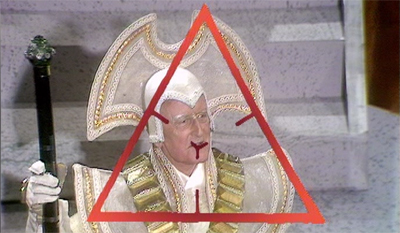


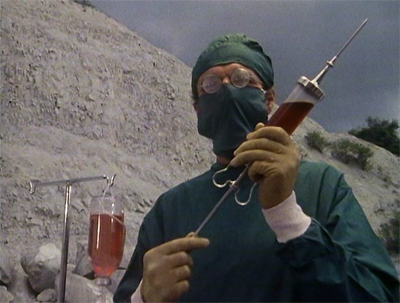


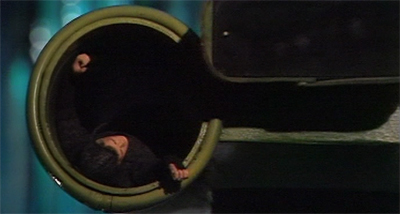



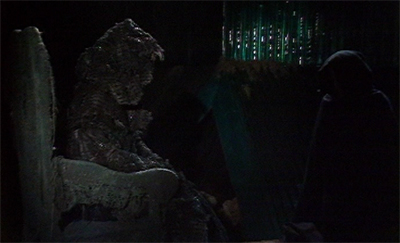
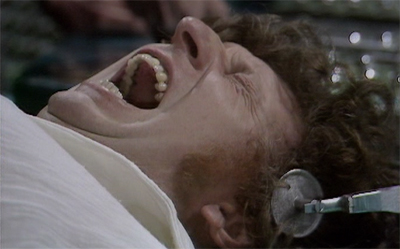
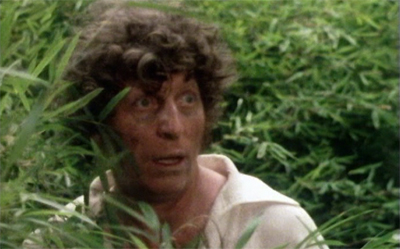
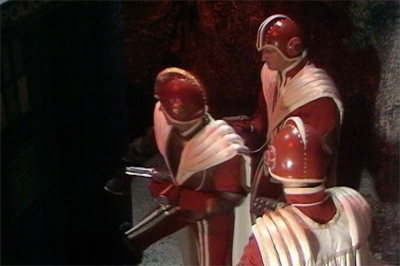





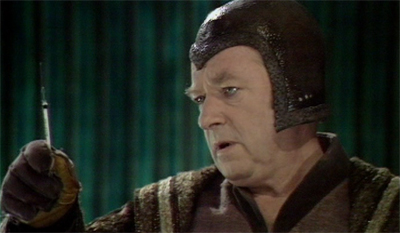
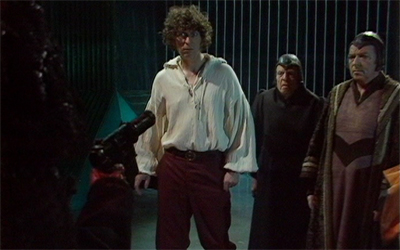







Leave a comment